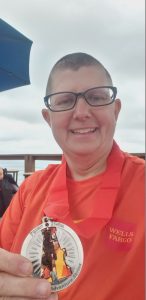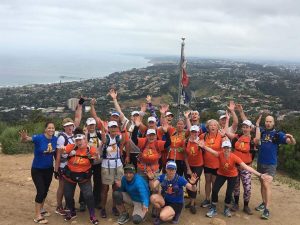Just 320 days after surgery for a brain aneurism, Dr. Linda Oakleaf, assistant professor of health, physical education and recreation, participated in a two-day, 52-mile Harbor to Harbor hike in California, trekking from Oceanside to San Diego.
“I’m really glad I did it in spite of the fact that my feet kinda looked like hamburger when I was finished,” she said with a laugh.
she said with a laugh.
When Dr. Oakleaf was recovering from the surgery she had last summer, someone told her about Project Athena, an organization that helps survivors of medical or traumatic setbacks “achieve their adventurous dreams.”
Along with the Harbor to Harbor trek, the nonprofit organization offers three other adventures each year: Grand Canyon Adventure Trek, San Diego Cove to Harbor Coastal Marathon Trek and a Florida Keys to Recovery Adventure.
“It’s not about trying to get back to what you were,” Project Athena Founder Robyn Benincasa wrote on its website. “It’s about trying to be the best of what you’re capable of today, this minute. The most gratifying thing is the moment when you see someone realize they’re going to make it, when you see the fear disappear and they realize how awesome they truly are!”
Dr. Oakleaf said she was immediately interested when she heard about Project Athena, and was awarded a grant from them that paid for her flight, transportation, hotel, food and even some training gear. Project Athena even provided her with a trainer through an app.
Dr. Oakleaf began training in January 2019, and the winter weather presented its own set of challenges. One day, she was iced in and walked up and down her basement stairs for 45 minutes. But working toward a goal really helped her on her way to recovery, she said. “Training made me feel better about myself and made me feel stronger.”
 The first day of the Harbor to Harbor trek, Dr. Oakleaf hiked 28 miles in about 11 hours, and the second day 24 miles in about 10 hours. A 40-minute climb up Mount Soledad on the second day was very challenging, she said, but the walkers helped each other and even had Project Athena “trail angels” to help if they needed it.
The first day of the Harbor to Harbor trek, Dr. Oakleaf hiked 28 miles in about 11 hours, and the second day 24 miles in about 10 hours. A 40-minute climb up Mount Soledad on the second day was very challenging, she said, but the walkers helped each other and even had Project Athena “trail angels” to help if they needed it.
“All of us had our struggles with our bodies, and we talked about it with each other,” she said of her fellow walkers. “They are now like family.”
Dr. Oakleaf was scheduled to teach classes in the summer of 2018 before she found out she had to have surgery, and she said she is grateful for her colleagues who not only took over her classes, but helped when she was recovering. “They were so supportive and kind. I couldn’t have done it without the help from everyone.”
Surgeons warned that she could have problems after the surgery, but she has no ill effects or deficits.
“There is no way to tell your colleagues that you are having brain surgery without sounding traumatic,” she said with a laugh. “It’s not your best day when you tell your dean that you may return from surgery with some brain deficits.”
“But,” she paused, “now I can even do crazy things like walk 50 miles.”
